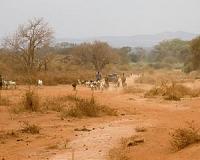 |
Paris (AFP) March 26, 2010 In one of Paris' top hotels this week, a crowd of foodies sat down for a tasting with a difference -- a nibble at rare French cheeses facing gastronomic extinction. Along with tipples of reds and whites, waiters dished up a palette ranging from pungent blue to goat-milk creaminess and crusty buttery cows' milk slabs. "What do they have in common?" said master cheese-maker Herve Mons. "They're made of raw milk." Of the 100-150 available raw milk cheeses available, three disappear each year, meaning around 40 have become extinct in the last decade. Held ahead of National Cheese Day, feting its 10th edition this weekend, the tasting was organised by a grouping bent on saving ancient cheeses from falling off the food map -- the Association Fromages de Terroirs. "The paradox," its president Veronique Richez-Lerouge told AFP, "is that we're known as the land of cheese yet we're losing an increasing number." Long known as a country of avid cheese-eaters, with more than 1,000 varieties in a symphony of creams, pale yellows and subtle shades of orange, overall cheese consumption is on the rise in France, but industrially-made products are outgunning traditional farm-crafted varieties. One of the last to go was the much-regretted and extremely creamy "Vacherin d'Abondance", named after the Alpine slopes in Savoy where Celine Gagneux grazed her race of cows for a cheese matured under an ancestral recipe. Then, in 2004, when aged 72, she gave up, unable to manage. "Her daughters refused to take over and she refused to hand over her know-how to an industrial concern," said Richez-Lerouge. That is the fate of many of the rare raw milk cheeses -- produced for centuries in small corners of France from milk flavoured by local flowers and grasses and brought to maturity by mere handfuls of cheese-makers. And when a cheese becomes extinct, say the raw milk enthusiasts, the countryside too suffers. "Cows are sold and pastures planted with corn, which pollutes and transforms the land," said Richez-Lerouge. "Keeping old cheeses alive is a key to sustainable development." While Americans, Australians and Britons are increasingly going for unpasteurised cheese, in France raw milk cheeses dropped to 179,750 tonnes in 2008 against 183,500 tonnes in 2006. "The problem," said Laurent Mons, the cheesemaker brother of Herve Mons, who exports to 19 countries, "is economics. Small producers are unable to cope. They regroup and eventually sell out to large conglomerates." In comparison to wine, where small organic and natural labels are on the up and up, cheesemaking was a highly technical art requiring 365-day-a-year attention. "Consumers need to be made aware of the existence and variety of cheeses available outside the supermarket shelves," he said. However on National Cheese Day on Saturday, some 1,200 supermarkets across the country will be offering unpasteurised cheese.
Share This Article With Planet Earth
Related Links Farming Today - Suppliers and Technology
 Climate: Poor nations most at risk from plant loss
Climate: Poor nations most at risk from plant lossParis (AFP) March 24, 2010 Global warming could reduce the range of plant biodiversity by more than nine percent by century's end, and poor countries least to blame for the problem will be worst hit, a study published on Wednesday says. German biologists used the UN climate panel's computer models for possible temperature rise, and crunched through data on "capacity for species richness," or CSR, meaning the likely co ... read more |
|
| The content herein, unless otherwise known to be public domain, are Copyright 1995-2010 - SpaceDaily. AFP and UPI Wire Stories are copyright Agence France-Presse and United Press International. ESA Portal Reports are copyright European Space Agency. All NASA sourced material is public domain. Additional copyrights may apply in whole or part to other bona fide parties. Advertising does not imply endorsement,agreement or approval of any opinions, statements or information provided by SpaceDaily on any Web page published or hosted by SpaceDaily. Privacy Statement |